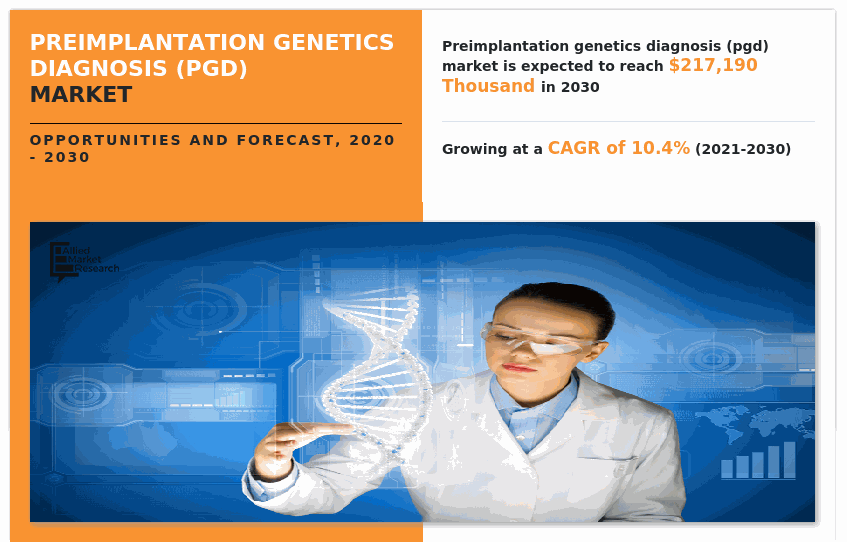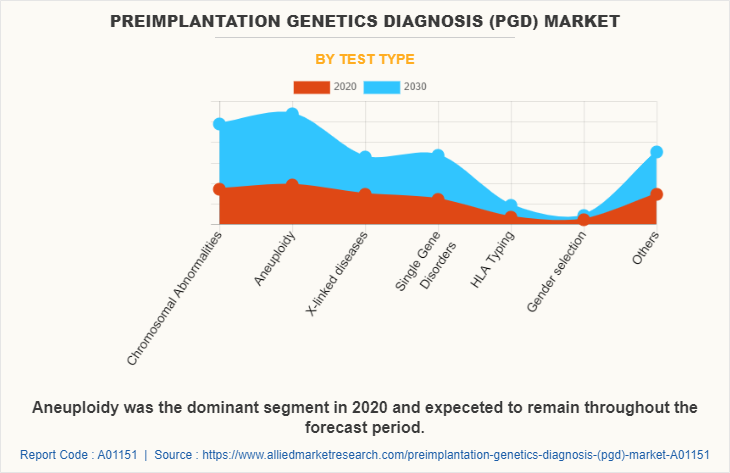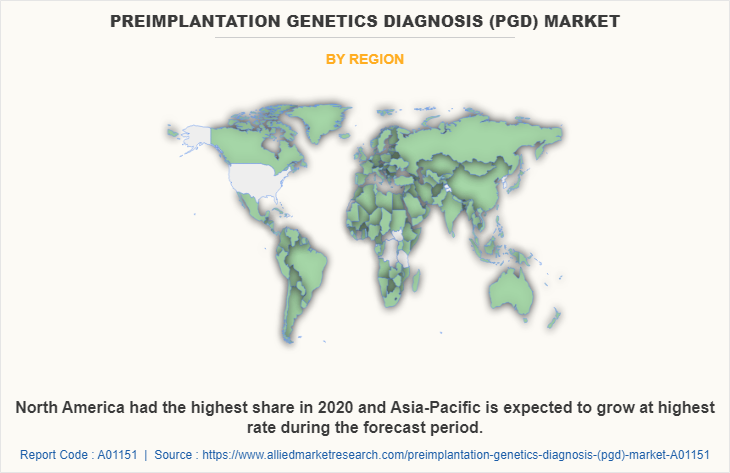Preimplantation Genetics Diagnosis (PGD) Market Research, 2030
The global preimplantation genetics diagnosis (PGD) market size was valued at $81,520.20 thousand in 2020, and is projected to reach $217,190.00 thousand by 2030, growing at a CAGR of 10.4% from 2021 to 2030. PGD is a technique used for detecting genetic defects in embryos developed through in vitro fertilization (IVF) before pregnancy. PGD involves performing tests on embryos to determine genetic abnormality. PGD is an alternative to current post conception diagnostic procedures.

Market Introduction and Definition
PGD act as a tool in ivf genetic testing, which helps in examination of embryos beyond their superficial appearance. PGD significantly reduces the chances of conceiving unhealthy embryos by performing embryo genetic testing, thereby being a major driving factor for the growth of the market. Furthermore, it also increases chances of successful healthy pregnancies. In additions, factors, including increase in consumption of alcohol, drugs, smoking, and poor diet; rise in stress; growth in environmental toxins, and surge in health problems associated with hormones have increased the infertility cases across the globe. This has fueled the use of IVF, thereby positively influencing the growth of the market. In addition, advantages, including development of savior siblings and increase in adaptation of assisted reproductive technology (ART) in developing countries are expected to provide lucrative growth opportunities for PGD market. Furthermore, increase in risk of fatal genetic, hereditary and chromosomal diseases such as Duchenne muscular dystrophy, down syndrome, cystic fibrosis, triploidy, and thalassemia encourage patients to opt for PGD thereby, boosting the growth of preimplantation genetics diagnosis market size.
Key Market Dynamics
According to the Centers for Disease Control and Prevention (CDC), in 2019, fertility clinic success rates report 330,773 ART cycles were performed across 448 reporting clinics, which resulted in 77,998 live births. In addition, over the last decade, usage of ART has almost doubled, accounting for approximately 2.1% of all infants born in the U.S. each year. Furthermore, according to the Human Fertilization and Embryology Authority, UK, pre-implantation genetic diagnosis for monogenic or single-gene disorders (PGT-M) can be used to avoid more than 600 genetic conditions. In addition, according to the Statics Canada, in 2019, fertility rate in Canada decreased from 1.47 children per woman to a record low of 1.40 children per woman in 2020. Furthermore, in 2020, Canada recorded lowest number of births and decrease in birth by 3.6%, which is greatest decrease since 2006. This trend of decreasing fertility rate is observed in many countries across the globe. These factors positively influence preimplantation genetics diagnosis market share.
The novel coronavirus has rapidly spread across various countries and regions, causing an enormous impact on lives of people and overall community. It began as a human health condition and has now become a significant threat to global trade, economy, and finance. The COVID-19 pandemic increased the importance of government healthcare facilities, thereby increasing healthcare expenditure across the globe. Furthermore, COVID-19 cases are expected to reduce in future as vaccine is introduced in the market. This led to reopening of companies that offer PGD. This helped the market to recover by the start of 2022. Companies focus on protecting their staff, operations, and supply networks to respond to urgent emergencies and establish new methods of working post-pandemic. Moreover, financial slowdown caused by COVID-19 negatively influenced the preimplantation genetics diagnosis market growth.
Furthermore, high accuracy of PGD in detecting genetic disorders increased its popularity in the market. In addition, increase in investment for detection of genetic disorders and chromosomal abnormalities across the globe propels the market growth. In addition, the rise in awareness regarding advantages of PGD in developing countries of Asia-Pacific is a major preimplantation genetics diagnosis market opportunity.

The global preimplantation genetics diagnosis market is segmented on the basis of test type, and region. By test type, it is categorized into chromosomal abnormalities, aneuploidy, X-linked diseases, single gene disorders, human leukocyte antigens (HLA) typing, gender selection, and others. Region wise, it is analyzed across North America, Europe, Asia-Pacific, and LAMEA. North America dominated the market in 2020, accounting for the highest share, and is anticipated to maintain this trend throughout the preimplantation genetics diagnosis market forecast period. This is attributed to increase in population and rise in spending of healthcare facilities.

Competitive Landscape
Key companies profiled in the PGD market report include Agilent Technologies, Inc., CeGaT GmbH, Illumina Inc., Illumina Inc., Invitae Corporation, Laboratory Corporation of America Holdings, Natera Inc., PacGenomics, PerkinElmer, Inc., Quest Diagnostics Inc., and Reproductive Genetic Innovations (RGI).
Key Benefits for Stakeholders
- This report provides a quantitative analysis of the market segments, current trends, estimations, and dynamics of the preimplantation genetics diagnosis market analysis from 2020 to 2030 to identify the prevailing preimplantation genetics diagnosis market opportunity.
- The market research is offered along with information related to key drivers, restraints, and opportunities.
- Porter's five forces analysis highlights the potency of buyers and suppliers to enable stakeholders make profit-oriented business decisions and strengthen their supplier-buyer network.
- In-depth analysis of the preimplantation genetics diagnosis (pgd) market segmentation assists to determine the prevailing market opportunities.
- Major countries in each region are mapped according to their revenue contribution to the global market.
- The key players within preimplantation genetics diagnosis industry are profiled in this report and their strategies are analyzed thoroughly, which help understand the competitive outlook of the preimplantation genetics diagnosis industry.
- The report includes the analysis of the regional as well as global preimplantation genetics diagnosis market trends, key players, market segments, application areas, and market growth strategies.
Preimplantation Genetics Diagnosis (PGD) Market Report Highlights
| Aspects | Details |
| By Test Type |
|
| By Region |
|
| Key Market Players | Reproductive Genetic Innovations (RGI), PerkinElmer, Inc., Quest Diagnostics Inc., cegat gmbh, Invitae Corporation, Natera Inc., Illumina Inc., Agilent Technologies, Inc., pacgenomics, Laboratory Corporation of America Holdings |
Analyst Review
The preimplantation genetic diagnosis(PGD) market witnessed significant growth in past few years, owing to rapid adoption of in vitro fertilization (IVF) across the globe and increase in awareness regarding embryo health.
The ability of PGD to significantly reduce chances of conceiving unhealthy embryos and increase in the probability of successful healthy pregnancies, propelled the growth of the market. Furthermore, factors including increase in consumption of alcohol, drugs, smoking, and poor diet increased the infertility cases across the globe, which, in turn, increases demand for PGD. In addition, PGD can be effective in preventing fatal genetic, hereditary, and chromosomal diseases, including Duchenne muscular dystrophy, down syndrome, and cystic fibrosis .
Moreover, increase in popularity of IVF in developing countries is expected to provide lucrative growth opportunities for the PGD market.
The base year is 2020 in PGD market.
The forecast period for PGD market report is 2021-2030.
Key players in he industry have focused on development of non-invasive preimplantation genetic testing, for detection of chromosomal abnormalities.
Aneuploidy is the leading test type segment in the PGD market.
North America is largest regional market in PGD.
In 2020 the PGD market was valued at $81,520.2 thousand.
The major market participants profiled in this report include Agilent Technologies, Inc., CeGaT GmbH, Illumina Inc., Illumina Inc., Invitae Corporation, Laboratory Corporation of America Holdings, Natera Inc., PacGenomics, PerkinElmer, Inc., Quest Diagnostics Inc., and Reproductive Genetic Innovations (RGI).
Loading Table Of Content...



